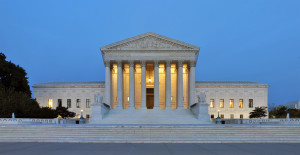Study: Supreme Court ‘right to work’ ruling could drag down pay
New report finds link between ‘right-to-work’ rules and lower wages for public employees.
The nine Supreme Court judges will soon hear arguments in Friedrichs v. California Teachers Association, and their ruling could transform all of the American public sector into a “right-to-work” zone. The result could be lower wages for public employees around the country, according to the author of a recent study from the pro-union Economic Policy Institute (EPI).
At issue is whether non-union public employees can be legally required to pay so-called “fair share fees” to the unions that bargain their contracts. Proponents of right-to-work laws, which ban unions from charging such fees, argue that unions are political institutions, and that mandatory union fees violate the free speech rights of those who object to paying them.
Studies of the nation’s right-to-work states show that such laws tend to lead to lower union membership rates, and to drive down wages among government employees.
Jeffrey Keefe, an EPI researcher and former professor of labor relations at Rutgers University, found that states that adopt public sector right-to-work rules — also known as “open shop” laws — see government worker pay fall by between 4.4 and 11.2 percent relative to non-right-to-work states.
Keefe said he attributed the wage decline to reduced bargaining ability on the part of unions, a result of non-members declining to pay them representation fees. He said a ruling against the California Teachers Association in the Friedrichs case would likely have a similar effect, but one that would likely be nationwide.
“The contagion from free-riding doesn’t work itself out overnight,” he said. “But it would work itself out over a five- to 10-year period. Over time these unions would have significantly lower revenue, which translates into lower capacity to represent union members.”
He suggested this could also affect contracts more widely, beyond the issue of wages. Negotiating the scope of health care and other benefits is a complex and resource-intensive process, he said. As members drop out of the union and non-members decline to pay representation fees, the funds needed to properly bargain for those benefits would decline, he added.
“A great deal of bargaining now is over health care, and it’s an incredibly complicated subject,” Keefe said. “The union really needs hired experts to come in and help.”

